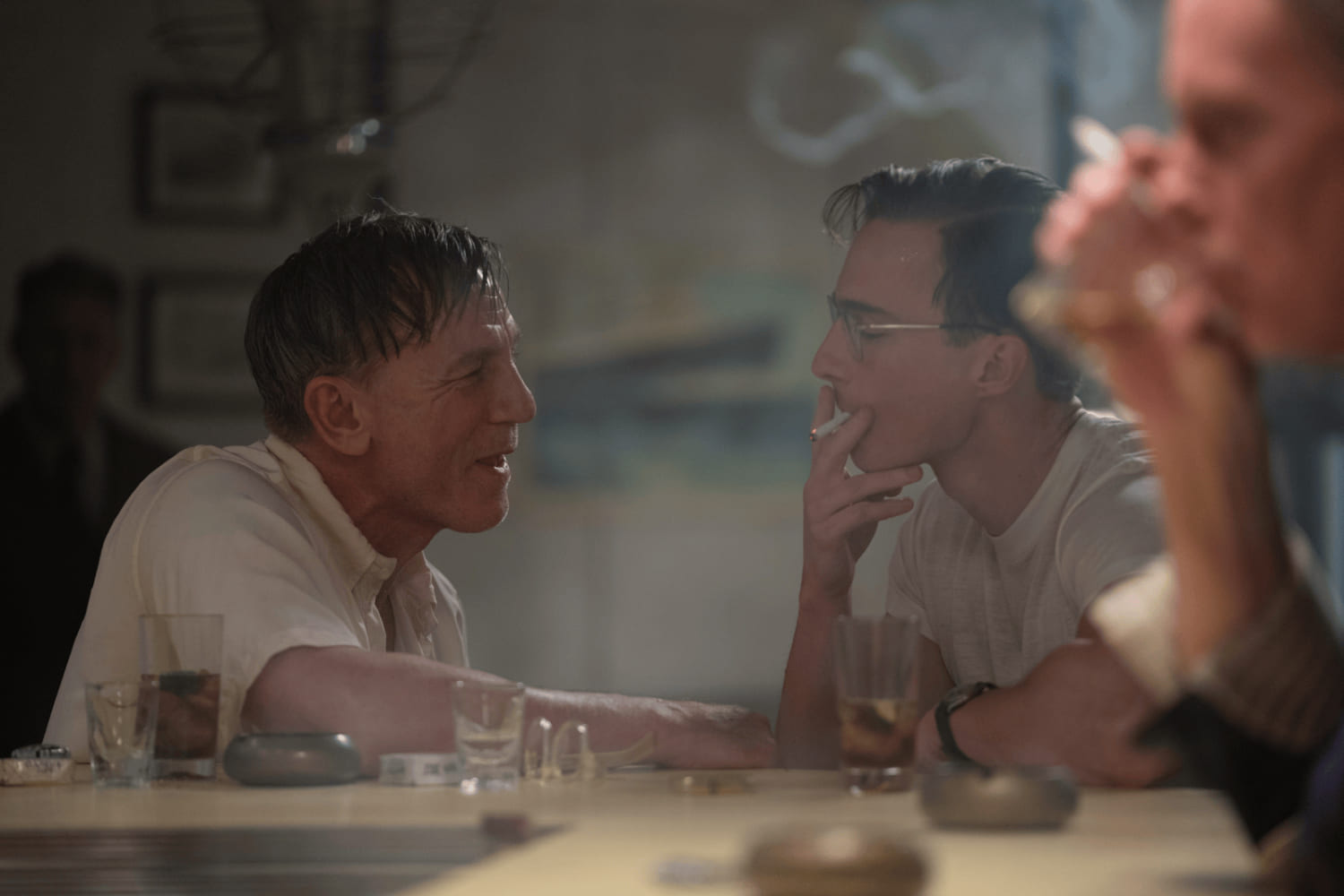
Daniel Craig as William Lee and Drew Starkey as Eugene Allerton in a scene from "Queer." (Photo by Yannis Drakoulidis. Courtesy of A24)
“The following is intended for mature audiences.” So goes the advisory before several TV shows you may have caught late at night on cable in the not-too-distant past. The words, not far removed from the more discreet rating explanations seen at the start of streaming series, filled up the screen and were typically uttered by a stern, male voiceover pro. They primed viewers for a generous helping of profanity, violent action, perhaps some gory mayhem.
And, in some cases, they served as a heads up to expect a flash of skin and depictions of sexual activity. You may have experienced a frisson of pleasure, as if you were about to get away with something forbidden. Remember that feeling? I miss that thrill, because such adult, though not always mature, content became increasingly rare away from certain longform television programs. As the years went by, I noticed with growing dismay how people in movies were getting lucky less and less often, especially in movies made by U.S. studios. Depictions of physical intimacy began to feel as if they had been negotiated with the actors' management team. Where did the raw abandon go? What became of that deep surrender?
Two thoroughly R-rated new releases opening in theaters this month after making the rounds at international film festivals seek to end this dry spell. One of them puts a 21st century spin on those illicit-affair potboilers that were all the rage in the late '80s and '90s, in theaters and on cable. The other adapts a controversial book by an influential American author, carrying over its depictions of same-sex couplings from the page to the big screen.
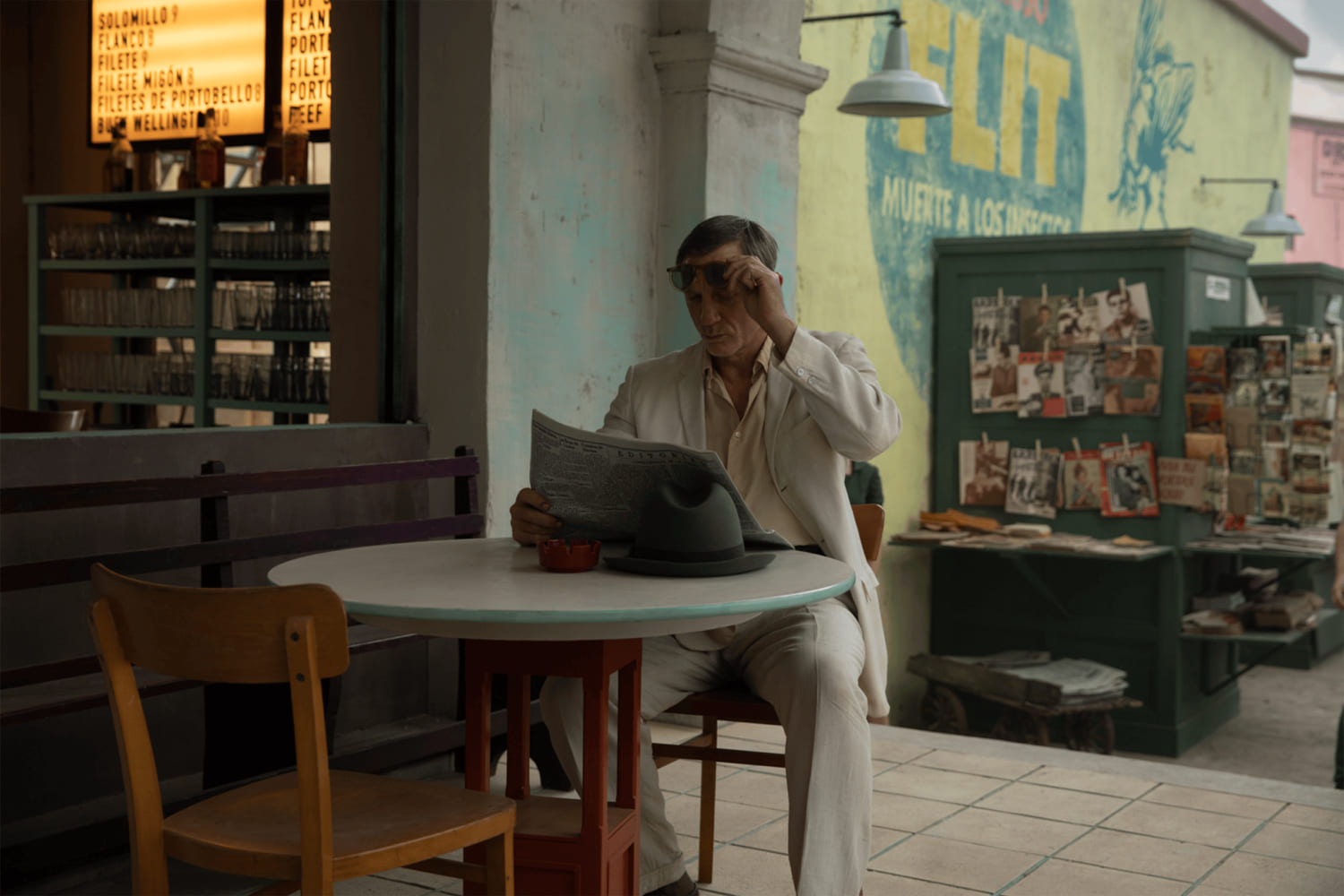
Daniel Craig as William Lee in a scene from "Queer." (Photo by Yannis Drakoulidis. Courtesy of A24)
Oh, and it bears pointing out: The following is intended for mature (or playfully immature) readers. You have been warned. Now, shall we take a peek? You know you want to.
“Queer”: Hungry hands grab a man's bare buttocks, and you feel it deep in your bones. Not only because the camera appears to be placed inches away from the contours of Omar Apollo's fleshy derriere, but because the sound mix captures this particular skin-on-skin contact with pinpoint accuracy. The moment is sensual, but there's an air of menace, a hostility dulled by libido and too much tequila.
This early scene in director Luca Guadagnino's foray into the vivid dreamscapes conjured up by author William S. Burroughs is set in a sleazy, strangely alluring love motel, the kind of disreputable establishment where time appears to stand still. The word you're probably thinking of is intoxicating, one that applies to the work of the Beat Generation writer, better known for his novel “Naked Lunch,” as well as the “Call Me by Your Name” and “I Am Love” filmmaker.
But these creators' sensibilities are not always compatible, and it's that conflict between these sometimes dueling voices that gives “Queer” its magnetic pull and makes it susceptible to its director's creative indulgences, some more effectively rendered than others.
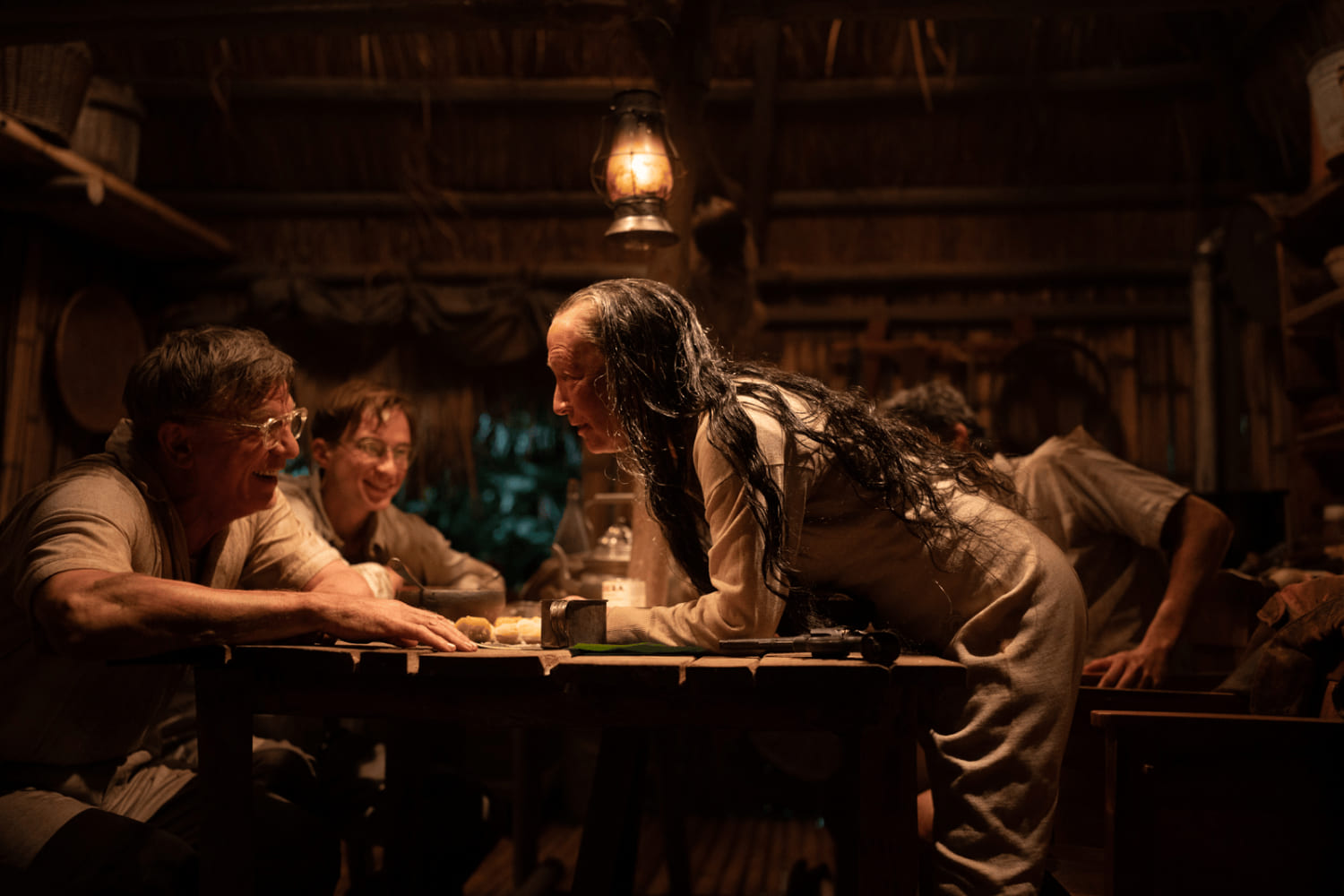
Daniel Craig as William Lee, Drew Starkey as Eugene Allerton and Lesley Manville as Dr. Cotter in a scene from "Queer." (Photo by Yannis Drakoulidis. Courtesy of A24)
Adapted from a semi-autobiographical novella that Burroughs wrote in the 1950s but did not see the light of day until 1985, “Queer” makes Burroughs' sometimes impenetrable prose more accessible to a wider audience. It also asks more of viewers than your basic prestige literary adaptation, which might be the way it initially comes across, with its striking period trappings. (Seriously, it looks stunning.) Look closer, though, and a thornier, weirder film materializes, with avant garde flourishes and an anachronistic soundtrack that includes Nirvana, Prince and New Order.
The A24 release takes place in Mexico City, in the decade Burroughs penned the source material. The author's stand-in is William Lee, played with a deft mix of melancholy, vulnerability, bitterness and just a dash of Tinseltown glamour by Daniel Craig. An expat whiling away the hours in an alcohol-fueled daze, Lee's days bleed into one another. A typewriter at his apartment looks like it's not being used as often as it ought to be.
Because what Lee wants is to get laid. The vibes scream “I just rolled out of bed,” and it's likely his best years are behind him in the looks department, but the bright-eyed Yank still manages to clean up nicely. When he makes an effort. After all, he's still able to snag a looker like the trick played by Apollo. One night, he sets eyes on Eugene Allerton (“Outer Banks'” Drew Starkey), and all his concerns, preoccupations and personal demons melt away.
But what follows, as Lee awkwardly courts the much younger Allerton, is not a pleasant boy-meets-boy romance. The object of Lee's desire is pretty, all right. Also, consistently non-committal. In other words, a tease. Tall and lanky, Allerton is like a sphinx; it's tough to get a read on him. We don't even know if the discharged Navy serviceman with the slight frame shares Lee's proclivities in the bedroom or if he's just curious about men who sleep with men. A subtle Mona Lisa smile is the only clue we get.
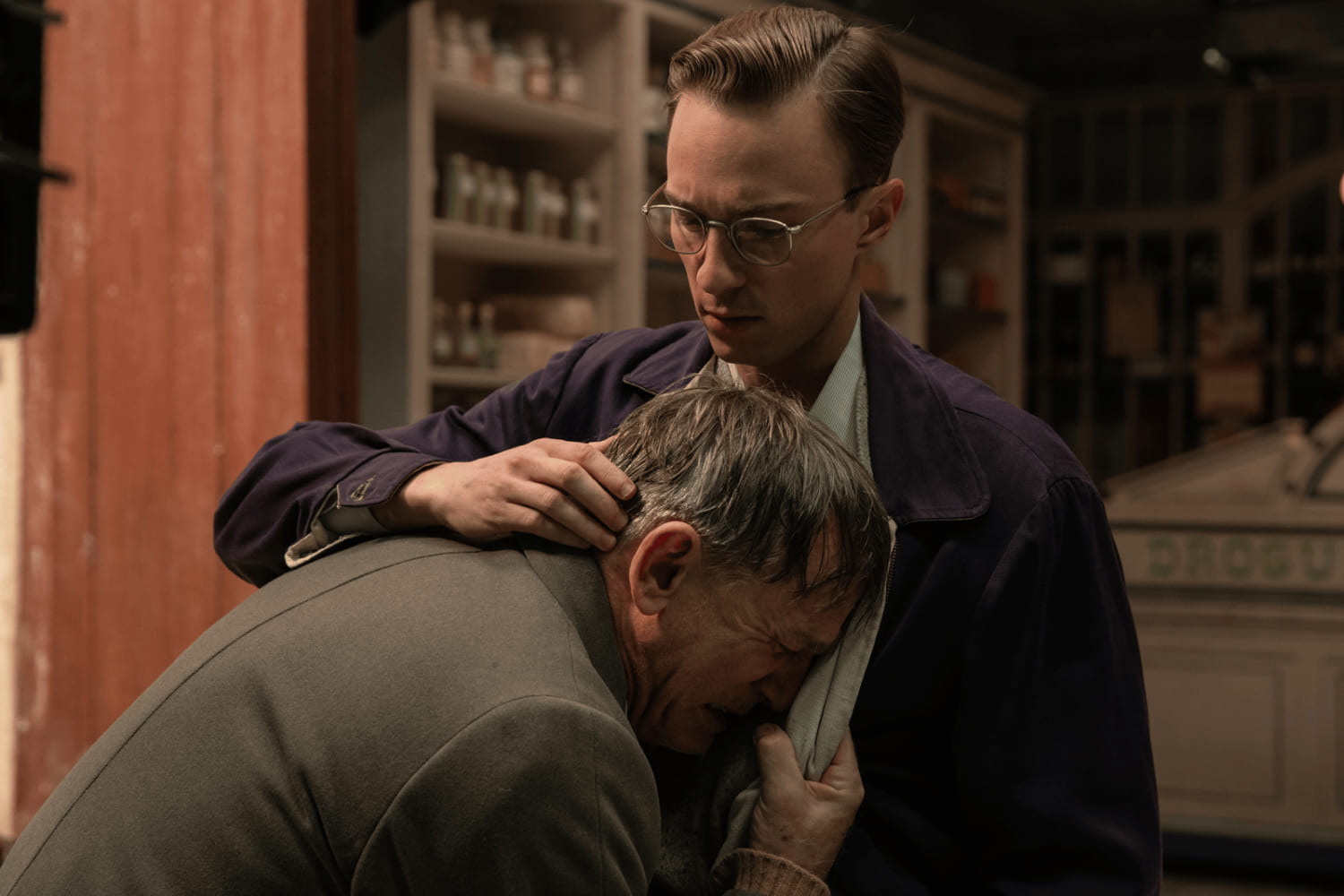
Daniel Craig as William Lee and Drew Starkey as Eugene Allerton in a scene from "Queer." (Photo by Yannis Drakoulidis. Courtesy of A24)
Once again teaming up with “Challengers” screenwriter Justin Kuritzkes, Guadagnino never lets viewers forget that the bond that develops between the men is transactional in nature. It's firmly rooted in what one can do for the other. There's also a refreshing lack of exposition that limits mentions of Lee's life before he arrived in Mexico to passing remarks.
As for whatever is happening between Lee and Allerton, it does not unfold in a vacuum. Lee's infatuation is happening under the amused gaze of (predominantly gay) expats who find themselves in a similar spot as Lee. Expats like fellow writer Joe Guidry (Jason Schwartzman). Impish, nerdy, heavy-set and even more of a horndog than Lee, Guidry is clearly modeled after Beat poet Allen Ginsberg. Although he is mostly relegated to Greek chorus/comic relief duties, the character earns our affection all the same. Schwartzman injects much-needed levity into this brooding undertaking.
Because “Queer,” sexually frank and unflinchingly honest, eventually deals head-on with the monkey on Lee's back. You see, when he's not ordering tequila shots, Lee fills his veins with smack. It's something that Guadagnino and Kuritzkes introduce gradually, with methodical precision, in a way that doesn't overpower its dissection of male desire.
Not long after, the movie morphs into a travelogue, after Lee sweet-talks Allerton into joining him on a trip to South America. Pristine vistas, vicious bickering, animalistic intercourse and a consultation with a judgmental doctor ensue. What brings Lee to Ecuador is a search for yagé, the psychoactive plant better known as ayahuasca. A stumble in the jungle brings the men to Dr. Cotter (“Phantom Thread's” Lesley Manville, trying on an American accent), who, Lee has learned, is doing research on the psychedelic drug.
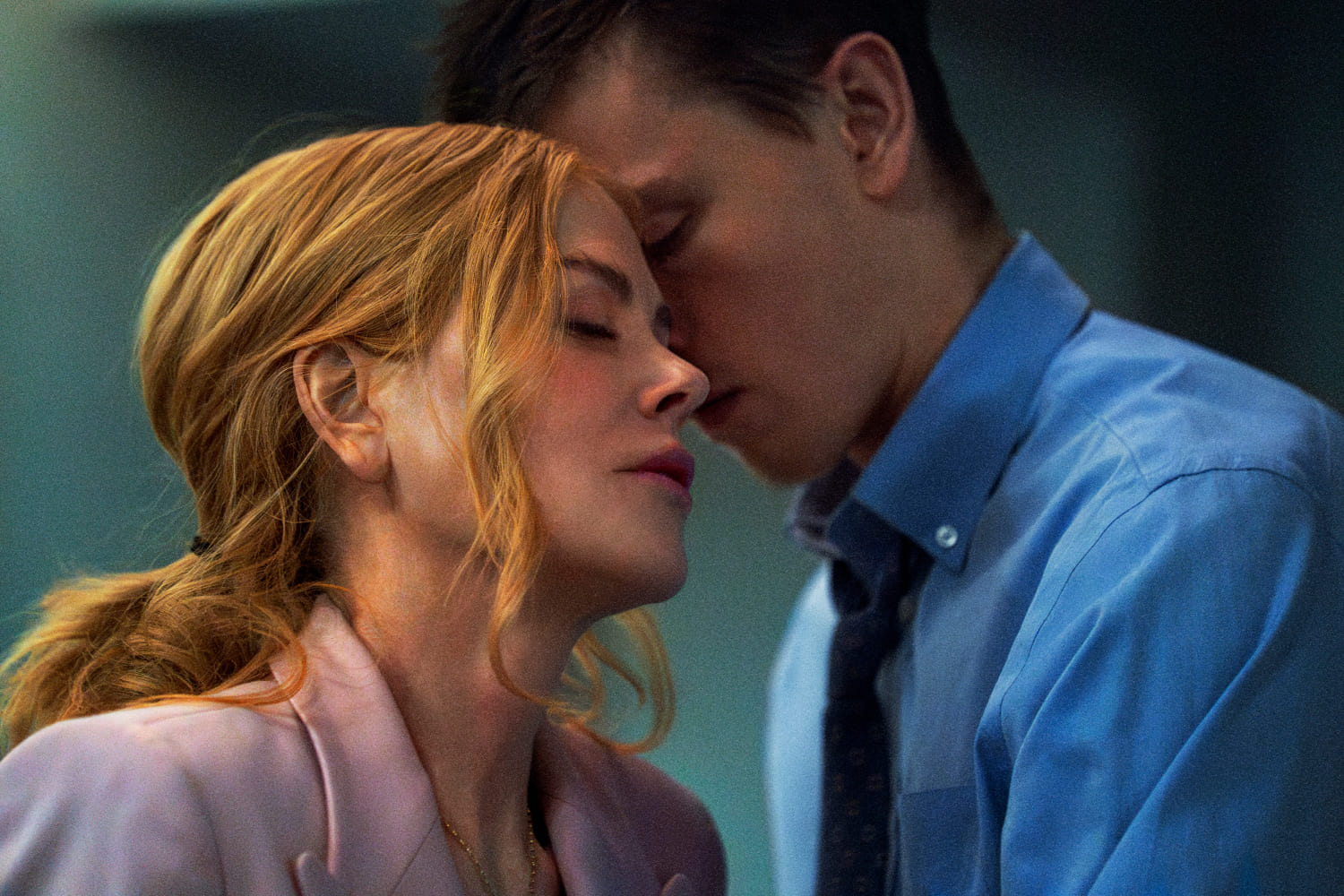
Nicole Kidman as Romy Mathis and Harris Dickinson as Samuel in a scene from "Babygirl." (Photo by Niko Tavernise. Courtesy of A24)
It's here, in the heart of the Amazon rainforest, where Lee, and the audience, hope to find enlightenment, or at least further insight into what ails Lee's spirit. Guadagnino's answers are a tad too literal, awash in phantasmagorical imagery that wouldn't look out of place in a horror movie. Compelling as these visuals are, they come at the end of a winding journey that sags in the midsection but is nevertheless touching in ways that sneak up on you.
“Queer” has faced criticism from those who feel Guadagnino doesn't do justice to Burroughs and his stream-of-consciousness turns of phrase, which have been a magnet for adventurous college students everywhere, even those, like yours truly circa 1991, who were not necessarily seeking to know more about mind-altering substances.
Yes, the detractors have a point. The film's structure feels lumpy; its languid rhythms allow narrative momentum to sputter, then rev up, in sharp contrast from the hopped-up energy that propelled “Challengers,” Guadagnino's frothy fusion of Lubitschian comedy and tennis-pro drama, released this past spring. And yet, it's hard not to be bowled over by “Queer's” cumulative effect. What emerges is a piercing portrait of unrequited longing and self-loathing, anchored by Craig and Starkey, both terrific, and a skillfully executed balancing act between its surreal and more sobering elements. It's beautifully imperfect, but also, just plain beautiful.
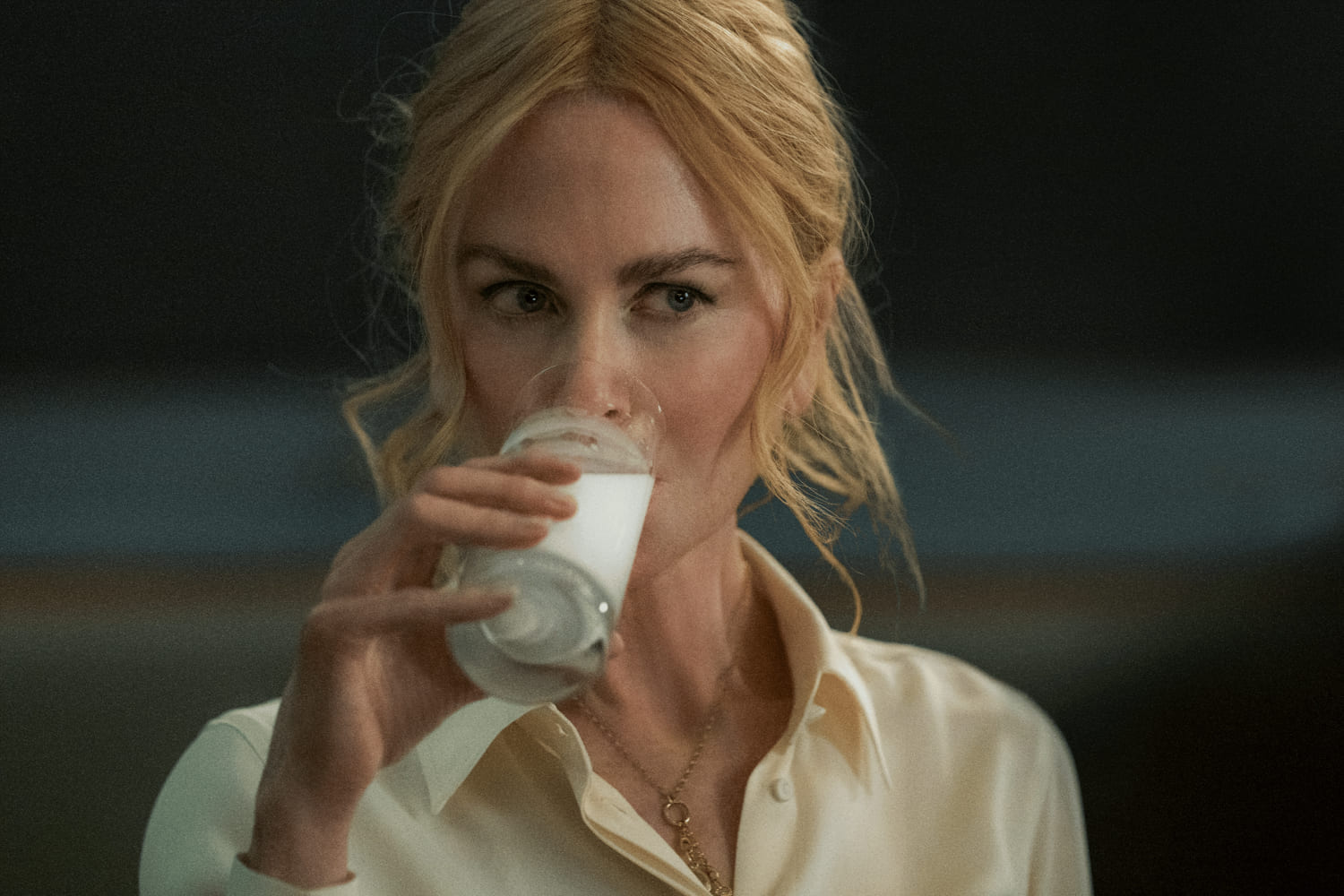
Nicole Kidman as Romy Mathis in a scene from "Babygirl." (Photo by Niko Tavernise. Courtesy of A24)
“Babygirl”: Nicole Kidman is on top. And she's moaning. As this stiff cocktail exploring the intersection of power, sexuality and corporate maneuvering opens, the Oscar winner/AMC Theatres ambassador, playing successful CEO Romy Mathis, is trying to please her husband Jacob, a hot daddy with a high libido and a salt-and-pepper beard, played by Antonio Banderas.
But it's all an act, at least on her part. Once her hubby climaxes, Romy scurries off to another room and turns on the porn that actually does the trick for her. The film's writer-director, Dutch filmmaker Halina Reijn, wastes no time in showing the cracks underneath the high-ranking executive's façade, while also making it clear that, aside from the intimacy problems she keeps to herself, Romy's domestic life, shared with Jacob and their two daughters Isabel (Esther McGregor) and Nora (Vaughan Reilly), is gratifyingly functional.
Romy doesn't know it yet, but chaos is right around the corner. It has a name: Samuel.
A bartender by night, Samuel (“Beach Rats'” Harris Dickinson) is one of the newest paid interns at Tensile, the New York City-based automation firm that Romy runs as effectively as she fakes an orgasm. Samuel is a study in arrogance and bad manners. While he is introduced to Romy along with the other interns, he asks Romy a rather blunt, confrontational question.
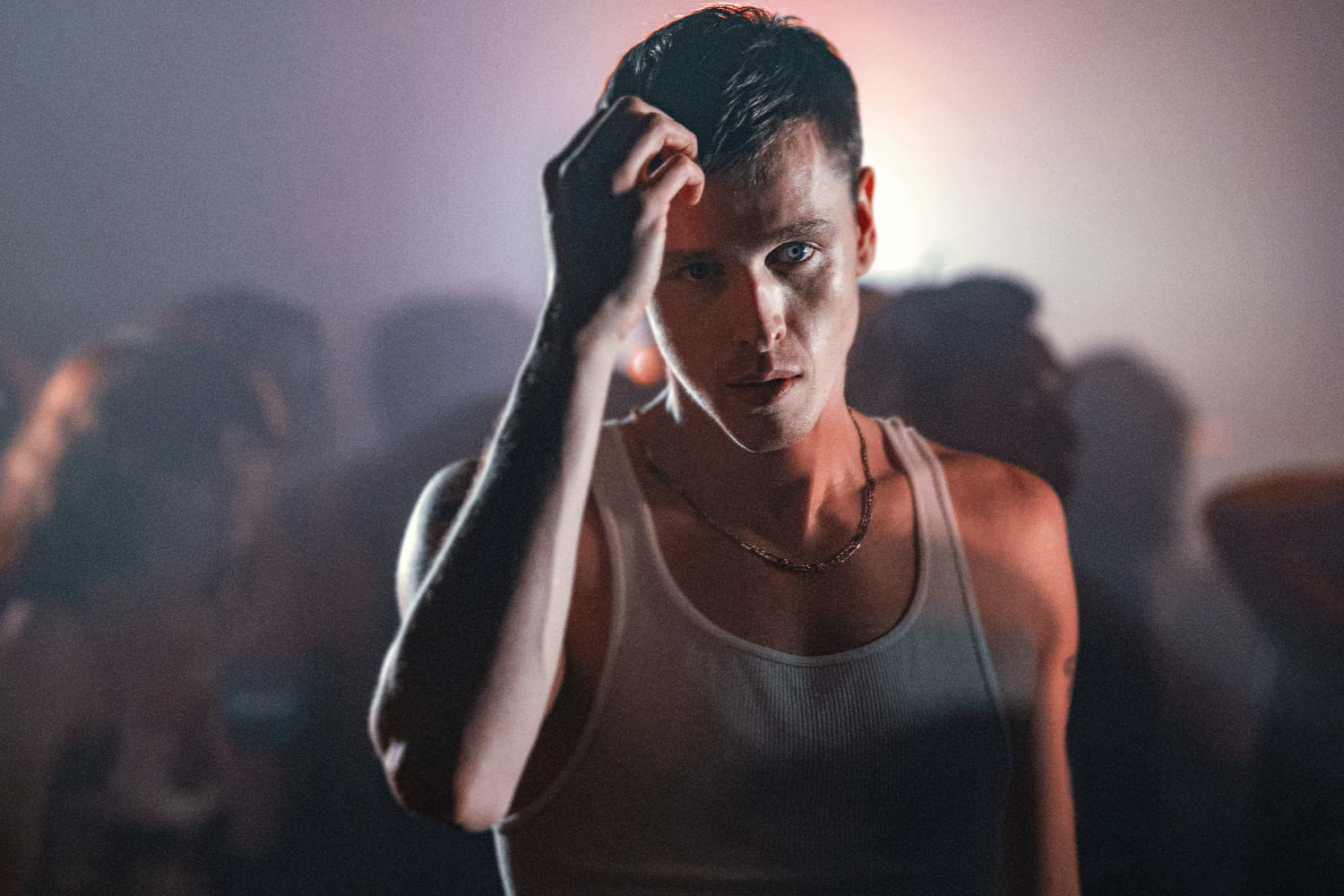
Harris Dickinson as Samuel in a scene from "Babygirl." (Photo by Niko Tavernise. Courtesy of A24)
But after the initial shock wears off, it's clear Romy, the kind of high-powered mover and shaker Tom Wolfe would call a Master of the Universe, is turned on by Samuel's complete disregard for decorum. When he chooses her as his mentor, you won't need Walter Mercado to know where this is going. What makes “Babygirl” more than a 2020s update of the kind of sultry thrillers that made the careers of filmmakers like Adrian Lyne (“Fatal Attraction”) and Zalman King (Showtime's “Red Shoe Diaries”) is twofold. Reijn defines Romy and Samuels' trysts by the disparity between the CEO/intern power gap and the tug of war between dominance and submission where Samuel is the alpha male Romy secretly craves.
“I think you want to be told what to do,” Samuel tells Romy with his signature candor before they embark on their high-stakes liaison.
Moreover, Reijn always links the affair back to the cutthroat corporate world, where Romy is a major player in what is still a male-dominated field. Fascinating from both a thematic and narrative point of view is the toll the affair has on Romy's relationship with her ace assistant Esme (Sophie Wilde), who is looking to continue climbing the corporate ladder and knows when to seize an opportunity
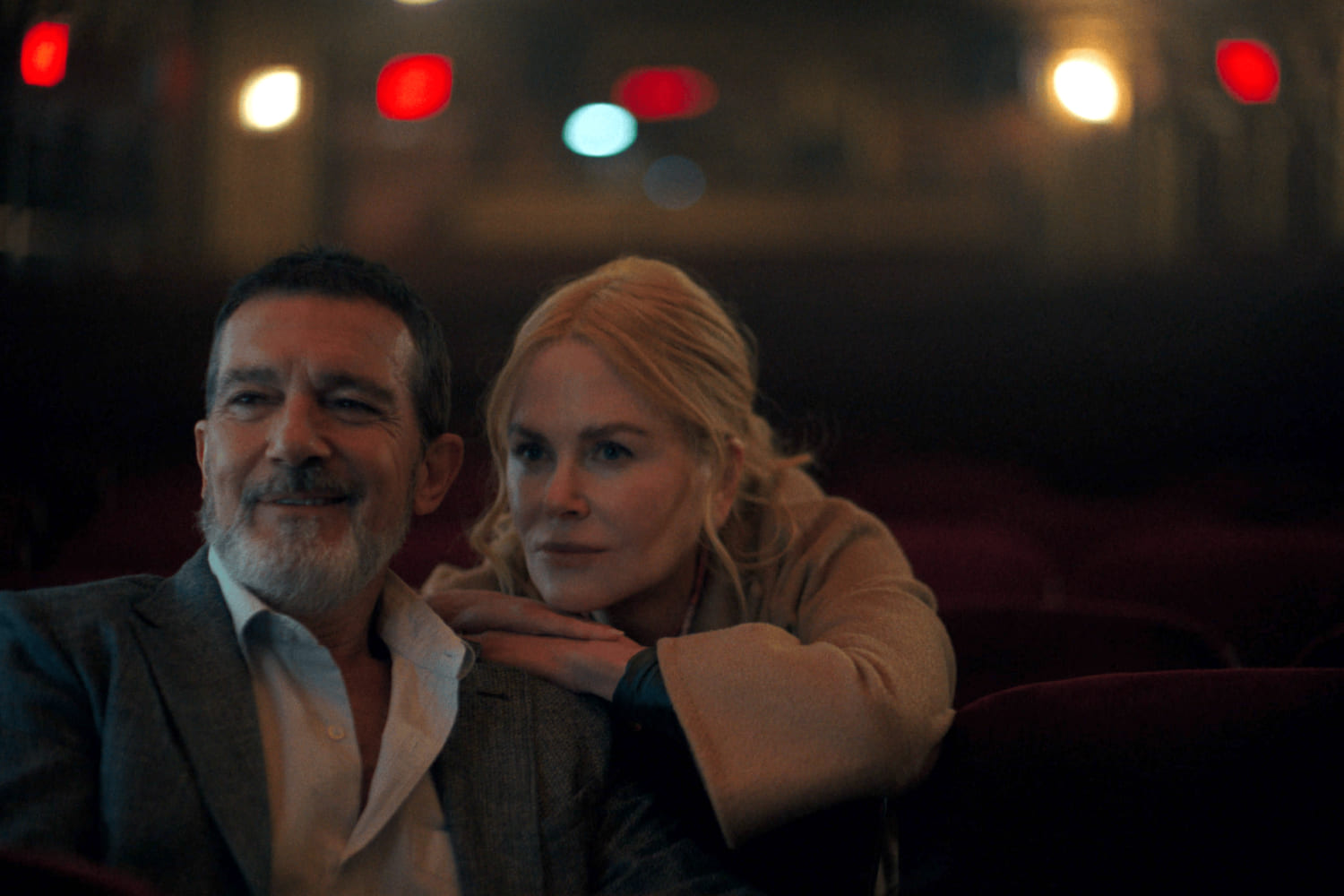
Antonio Banderas as Jacob and Nicole Kidman as Romy Mathis in a scene from "Babygirl." (Photo courtesy of A24)
Kidman is a marvel here. She delves into every nook and cranny of Romy's contradictions, chronicling the disintegration of the compartmentalizing that allowed her to juggle her professional and personal lives. It's her best performance since “Dogville,” Lars von Trier's star-studded Depression-era drama, back in 2003. Dickinson, also seen this fall in a supporting role in Steve McQueen's World War II drama “Blitz,” can't begin to match Kidman's high-wire act, but his Samuel is still a breakthrough for the young actor.
In the film's most memorable sequence, a shirtless Samuel dances to George Michael's “Father Figure” in a swanky hotel suite, while Romy luxuriates in the freedom that comes from shedding those inhibitions that prevent her from being wholly, unapologetically herself.
But “Babygirl's” secret weapon is Banderas, who unleashes pent-up layers of rage and frustration. I've always been a fan, but ever since his knockout performance in Pedro Almodóvar's “Pain and Glory,” the Spanish thespian has taken his craft to the next level. He becomes the wind fanning the flames of this kinky, full-throated conversation piece, a hot dish with a lot more than sex on its mind.
“Queer” is now showing in theaters across South Florida, including O Cinema South Beach, Regal South Beach, Silverspot Cinema in downtown Miami, Cinépolis in Coconut Grove, AMC Aventura 24, AMC Sunset Place 24 and Paradigm Cinemas: Gateway Fort Lauderdale. “Babygirl” opens in wide release Christmas Day.
 MAIN MENU
MAIN MENU

